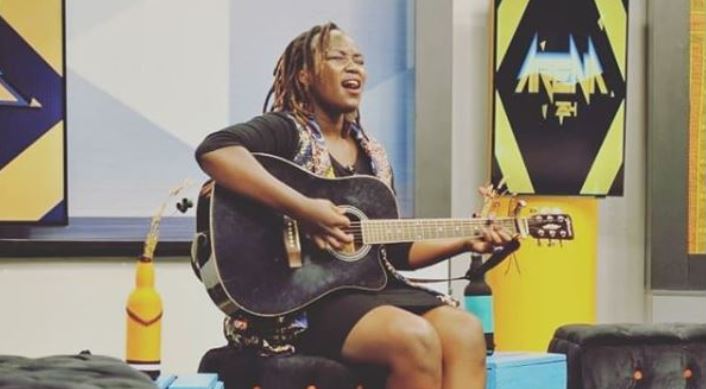
Nearly four years later, Serro has just dropped her debut album, ‘Kuwe’. In an interview with Pulse, she discusses the album, being compared to Suzanna Owiyo, misogyny in the local industry and more.
How did you get into music?
Growing up, my dad would blast the speakers with music and although I hated the genre of music he listened to, I would like to believe that it planted a seed. My interest grew in primary school where I participated in music festivals and was a member of all the groups that were created to sing during parents’ meetings.
Right after high school, I joined the girls’ choir of Kenya and for nine months, my days included preparing and going for rehearsals, and occasionally performing. I absolutely loved every bit of it and decided that I wanted to do that for the rest of my life.
Is it a well-paying profession?
It depends on what you consider well-paying. Just like any other profession, you have to work your way up. For people in corporate, you don’t just start and climb up to a managerial position, it takes time. The higher you go, the more money you make.
Have you ever been castigated for playing modern instruments and not traditional ones, like the Nyatiti?
No I haven’t. I honestly don’t think people care that much as long as the product is great. It would be nice to learn a traditional instrument though.
Tell us more about your long-awaited album. Any collaborations?
The album is titled Kuwe and will be available on all digital platforms from May 30, although you can pre-save/pre-add now. Most of the music was written during my campus years and I let the listener into what I was feeling. In it, I’m telling real-life stories, some of them mine, others simply based on observation.
On collaborations, there aren’t any in the sense of featuring an artist on a track, but the whole album is definitely a collaboration with Mutoriah, who produced and co-composed the entire album. My vision for the cover image and all the images for this album was in black and white to capture a powerful image that evokes emotion. The whole production team led by the photographer, Emmanuel Thuo, did a wonderful job.
What’s the importance of you building that support system?
Initially, I thought I could do it all by myself, but now with a team – Pweza Africa – I get to see the value. It can get quite overwhelming trying to compose music, book shows, negotiate with clients, schedule rehearsals, execute the creative visions and the many things that go into building a successful musician. It really does need a village and with a team, I am able to focus on the music.
Do you feel like the afro neo-soul sound in dholuo language limits you when trying to break into the mainstream?
I think it is more the sound than the language that makes it difficult to break into the mainstream market. We barely understand what most of the Nigerians or Tanzanians (their Swahili is quite intense) sing about, but we still enjoy the music. Sauti sol’s Disco Matanga is predominantly in Luhya but we still bump to it because it is wrapped in a sound that one would say is mainstream. My dream is that one day, the media and general public will create a space for all kinds of genres to thrive, from Gengetone to Benga and neo-soul.
Do you intend to cross over anytime soon?
This is a tough question. When I create, I usually try my best to be authentic to who I am. If I ever get to a point where the ‘mainstream sound’ feels authentic to me, then I will create that. But for now, I create what feels authentic to me.
What do you say about the comparisons to the legendary Suzanna Owiyo?
I am here for all of it. I think she is amazing and there is no one I would rather be compared to. I admire the fact that she has been able to create a brand that focuses on the music and not sideshows. I haven’t met her (yet) but I have watched her live a couple of times.
What next after the album, especially with this pandemic?
Like other industries, we are all exploring the digital space and seeing how we can find a new normal during and after the pandemic. I am not giving myself the pressure to have it figured out. For now, I am just trying to focus on the album release. The good thing is I can release it on digital platforms.
Is the music industry misogynistic?
It definitely is. The expectations put on women in the industry are insane. We have to look a certain way, speak a certain way, always be put together and somehow have it all figured out. The same expectations are not put on men. This, I believe, is just a reflection of the society in general.
Will we see you working with other artists in other capacities, such as song-writing or cameos?
Yes, of course. I am actually very interested in collaborations moving forward. Creating with other artistes is usually so mind-blowing and the product is great. You get to learn from them and they get to learn a thing or two from you.
https://www.instagram.com/p/B_wpqLcILwd/






